
AI workflow automation is transforming how businesses operate, offering tools to save time, reduce costs, and improve efficiency. Platforms like Prompts.ai, Domo, and Gumloop simplify complex processes, integrate seamlessly with existing systems, and provide real-time insights into operations. Here's what you need to know:
Why it matters:
Quick Tip: Start with platforms that align with your budget, security needs, and existing tech stack. Prompts.ai, for example, offers a transparent pricing model and extensive AI model access, making it a top choice for enterprises looking to streamline operations without overspending.
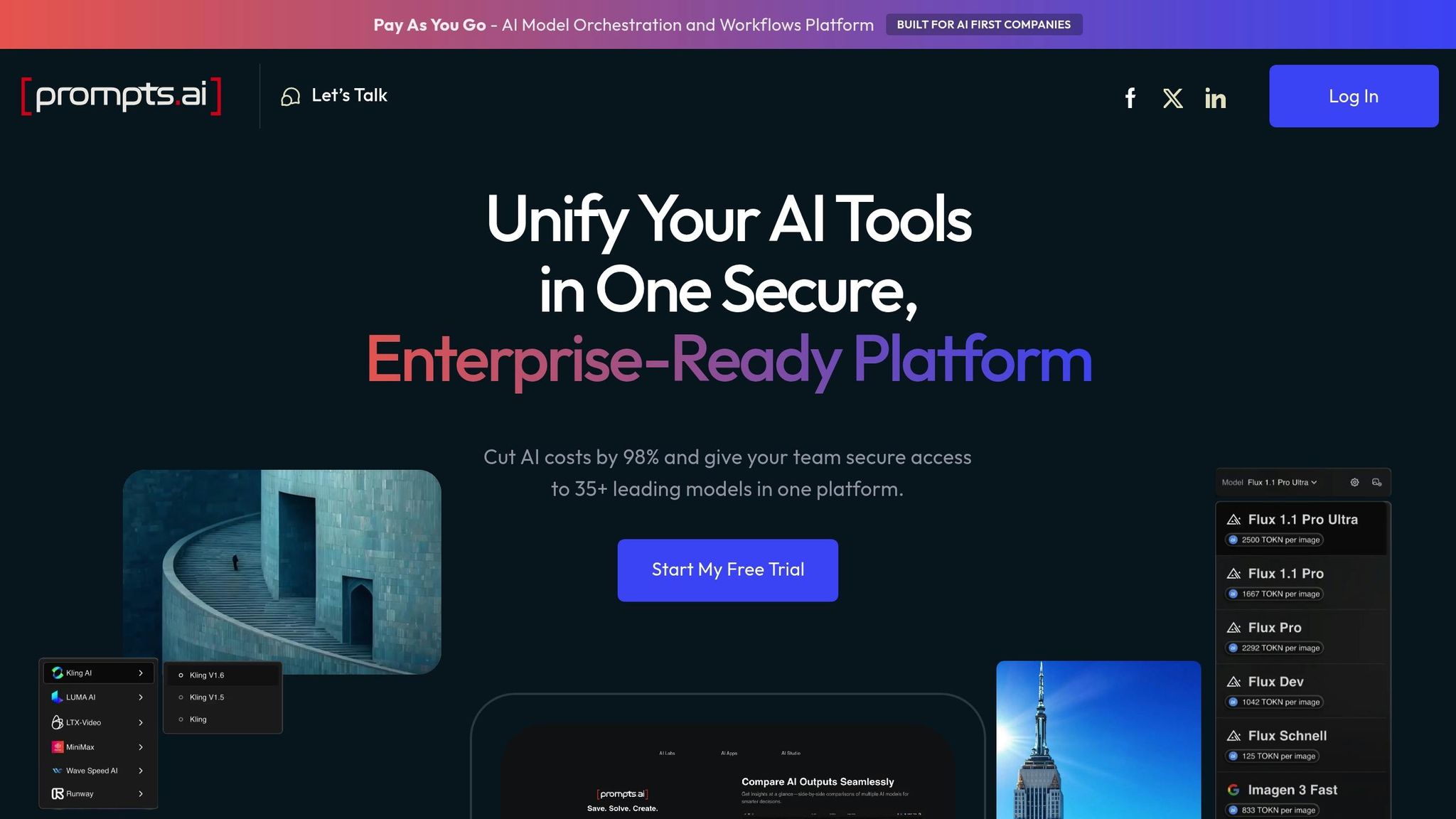
Prompts.ai is an enterprise-grade AI platform designed to bring together over 35 leading language models into a single, secure interface. By unifying these tools, it gives enterprises complete oversight and control of their AI operations, all while adhering to strict governance and security standards.
One of the biggest challenges for U.S. businesses today is managing AI tool sprawl. Instead of navigating multiple subscriptions for models like GPT-5, Claude, LLaMA, and Gemini, Prompts.ai offers a centralized solution. Through a single dashboard, teams can access all these models, simplifying operations and enabling businesses to scale their AI usage without compromising security or governance.
Prompts.ai integrates effortlessly with existing enterprise systems, allowing businesses to implement AI workflows without overhauling their current infrastructure. The platform uses a Pay-As-You-Go TOKN credits system, eliminating recurring subscription fees and aligning costs with actual usage. This approach ensures a clear return on investment for U.S. companies.
A standout feature is the ability to compare performance across models side by side. This helps teams identify the best AI solution for specific tasks, whether it’s content creation, data analysis, or customer service automation. By streamlining model selection and orchestration, Prompts.ai empowers businesses to build efficient workflows tailored to their needs.
Prompts.ai provides access to 35+ top-tier language models, including GPT-5, Claude, and LLaMA, offering comprehensive coverage for a wide range of business applications. The platform is designed to support repeatable, compliant processes at scale.
To accelerate implementation, Prompts.ai includes pre-built "Time Savers" created by certified prompt engineers. These templates are designed to follow best practices from the start, and organizations can customize them to suit their unique needs - all while maintaining enterprise-level security.
Prompts.ai takes financial oversight to the next level with its built-in FinOps layer, which tracks every token used across models and teams. This real-time cost tracking provides businesses with a clear view of their AI spending, helping them optimize investments and directly link expenses to business outcomes.
The platform’s cost management tools include automatic model selection based on performance needs and budget limits. Teams can set spending caps, receive usage alerts, and generate detailed reports that break down costs by department, project, or user. This level of financial transparency empowers CFOs and IT leaders to make informed decisions about AI resource allocation, delivering substantial savings through better management.
Governance is a cornerstone of Prompts.ai’s architecture. The platform ensures compliance with industry regulations and internal policies by maintaining detailed audit trails for every AI interaction. Sensitive data stays under the organization’s control, addressing privacy concerns that often hinder AI adoption in regulated industries.
Prompts.ai also includes role-based access controls, allowing administrators to define who can access specific models, workflows, or data sets. This ensures that AI capabilities are distributed appropriately across the organization while maintaining strict security standards. Additionally, the Prompt Engineer Certification program helps businesses cultivate internal AI experts who can guide responsible practices and drive effective implementation. These features collectively ensure secure, efficient, and compliant AI operations, making it an essential tool for enterprise workflow automation.
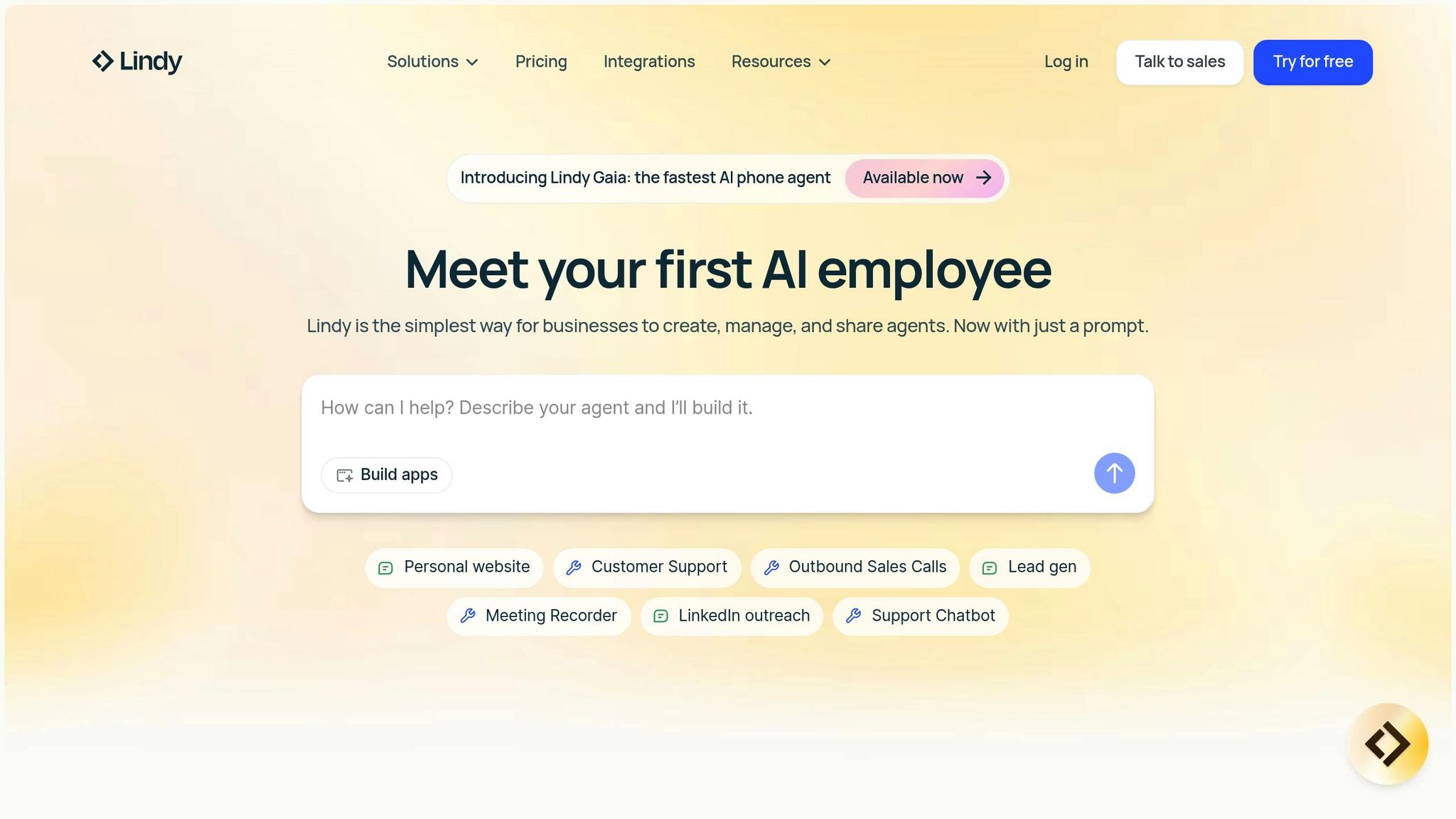
At this time, we don't have enough verified information to share specifics about Lindy's features, integrations, or pricing options. However, the platforms that follow offer thoroughly documented and reliable workflow automation solutions.
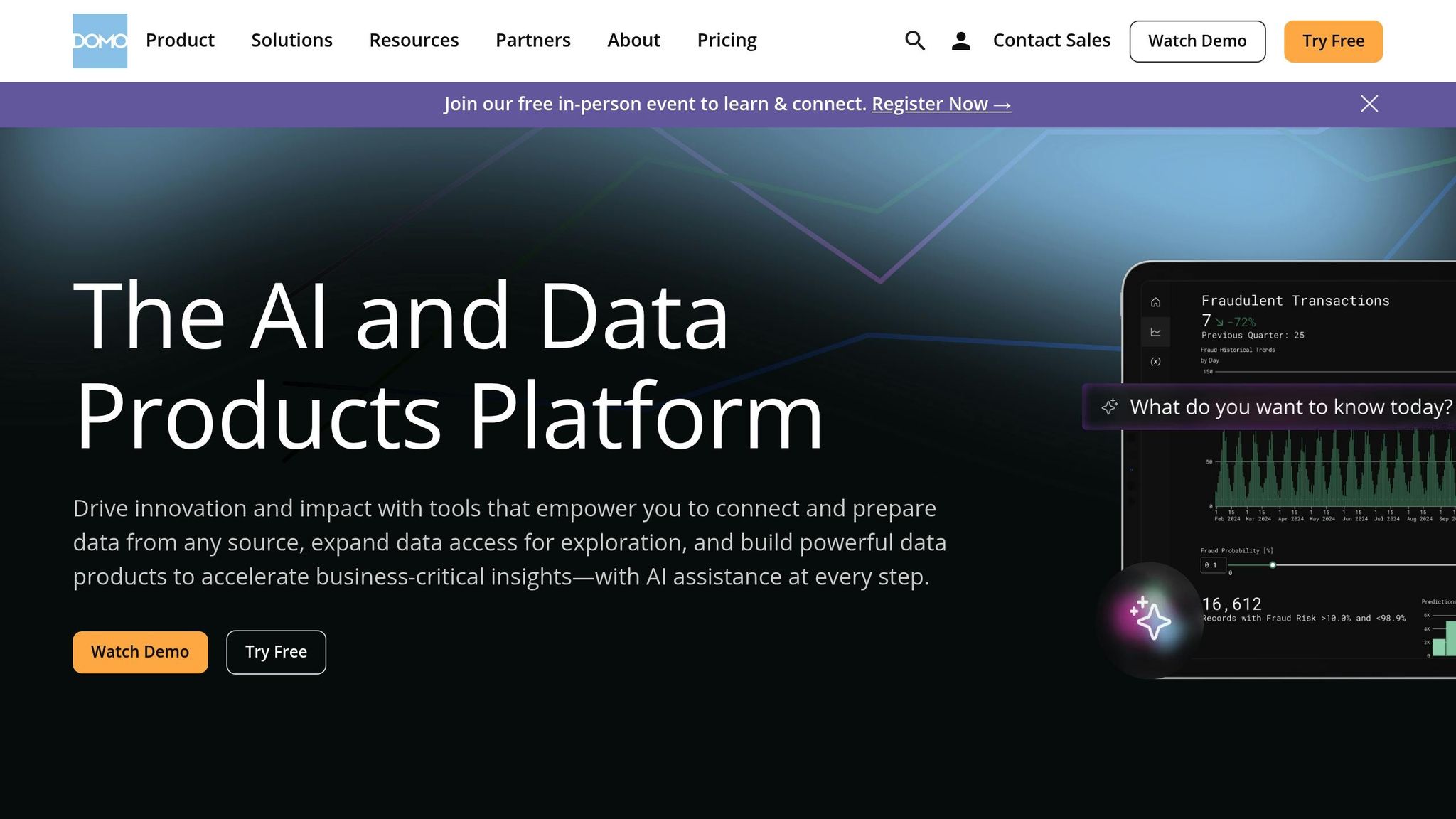
Expanding on its business intelligence expertise, Domo introduces AI-powered workflow automation to its cloud-native platform. Designed to seamlessly connect an organization’s data sources, Domo delivers actionable insights that enable automated decision-making for smoother operations.
Domo brings together multiple data sources into a single, cohesive view. It combines flexible data processing with strong data governance to ensure reliability and accuracy.
With AI-driven analytics at its core, Domo identifies key trends and automates workflow actions. This simplifies operations while eliminating the need for deep technical expertise.
Domo’s subscription model includes tools to monitor usage, helping organizations align their costs with actual resource consumption.
The platform prioritizes data security and compliance through role-based access controls and detailed audit trails. These features safeguard data, ensure regulatory adherence, and track any changes made.
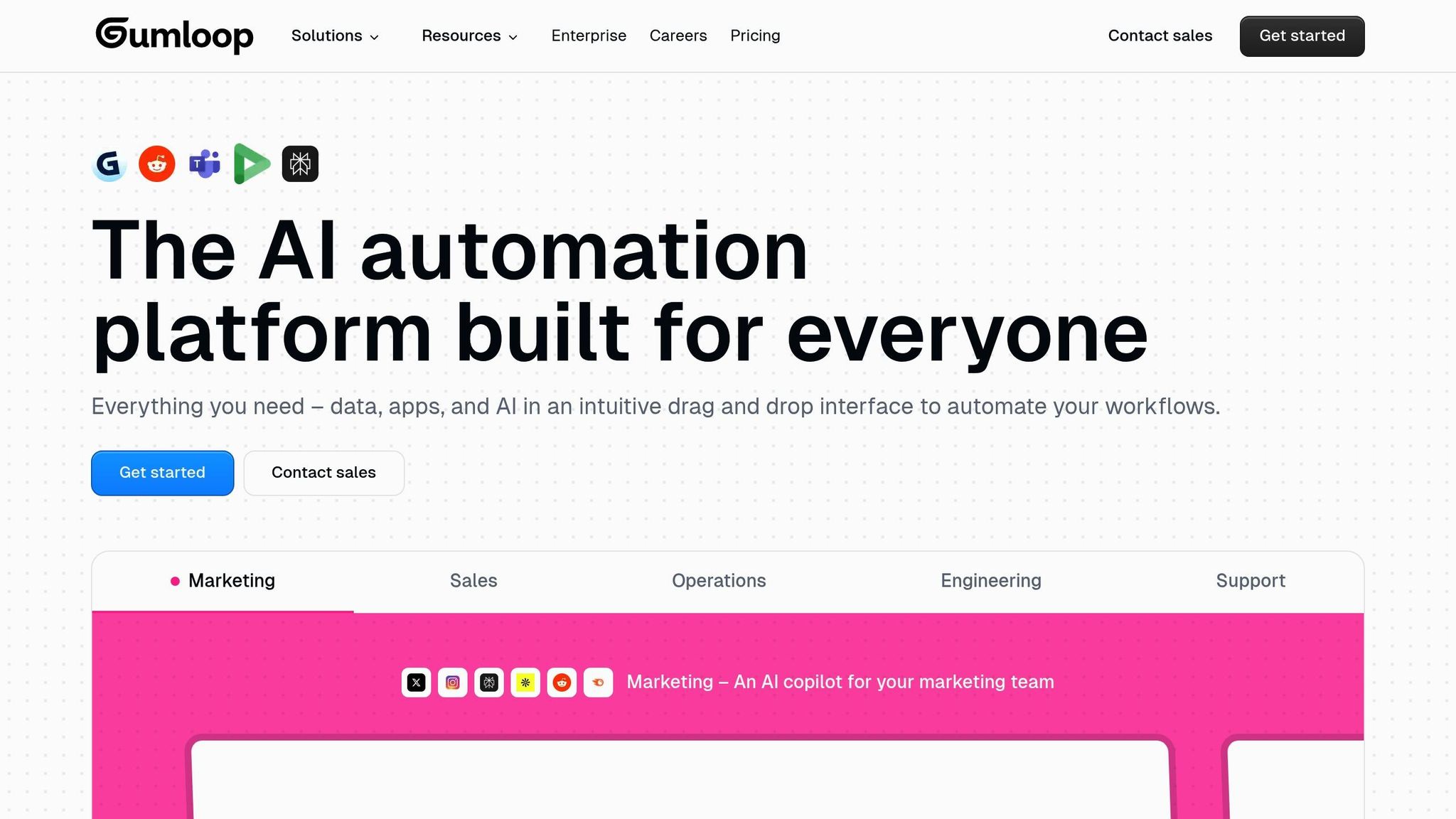
Gumloop stands out in the world of AI workflow solutions by offering a no-code platform designed to simplify automation. With its visual, drag-and-drop interface, Gumloop makes it possible to create and manage advanced AI workflows without needing any programming expertise.
Gumloop seamlessly connects with a wide range of business tools using pre-built connectors and APIs, ensuring real-time data synchronization. Its visual workflow builder empowers teams to design, test, and deploy workflows involving multiple steps. Additionally, webhook support allows integration with custom applications and older systems, making it highly adaptable to different organizational needs.
One of Gumloop's key strengths is its ability to centralize access to various AI models, removing the hassle of managing individual API keys. Its orchestration engine automatically selects the best model for each task, using conditional logic to optimize workflow efficiency and performance.
Gumloop operates on a credit-based pricing system, covering both platform usage and AI services. A user-friendly dashboard provides a clear view of credit consumption, with budget alerts in place to help manage expenses effectively.
For organizations prioritizing security and control, Gumloop offers robust governance tools. Role-based access controls limit who can create and edit workflows, while administrators can review and approve workflows before they go live. The platform also maintains detailed audit logs of workflow executions and user actions, complemented by data encryption to meet enterprise security standards.
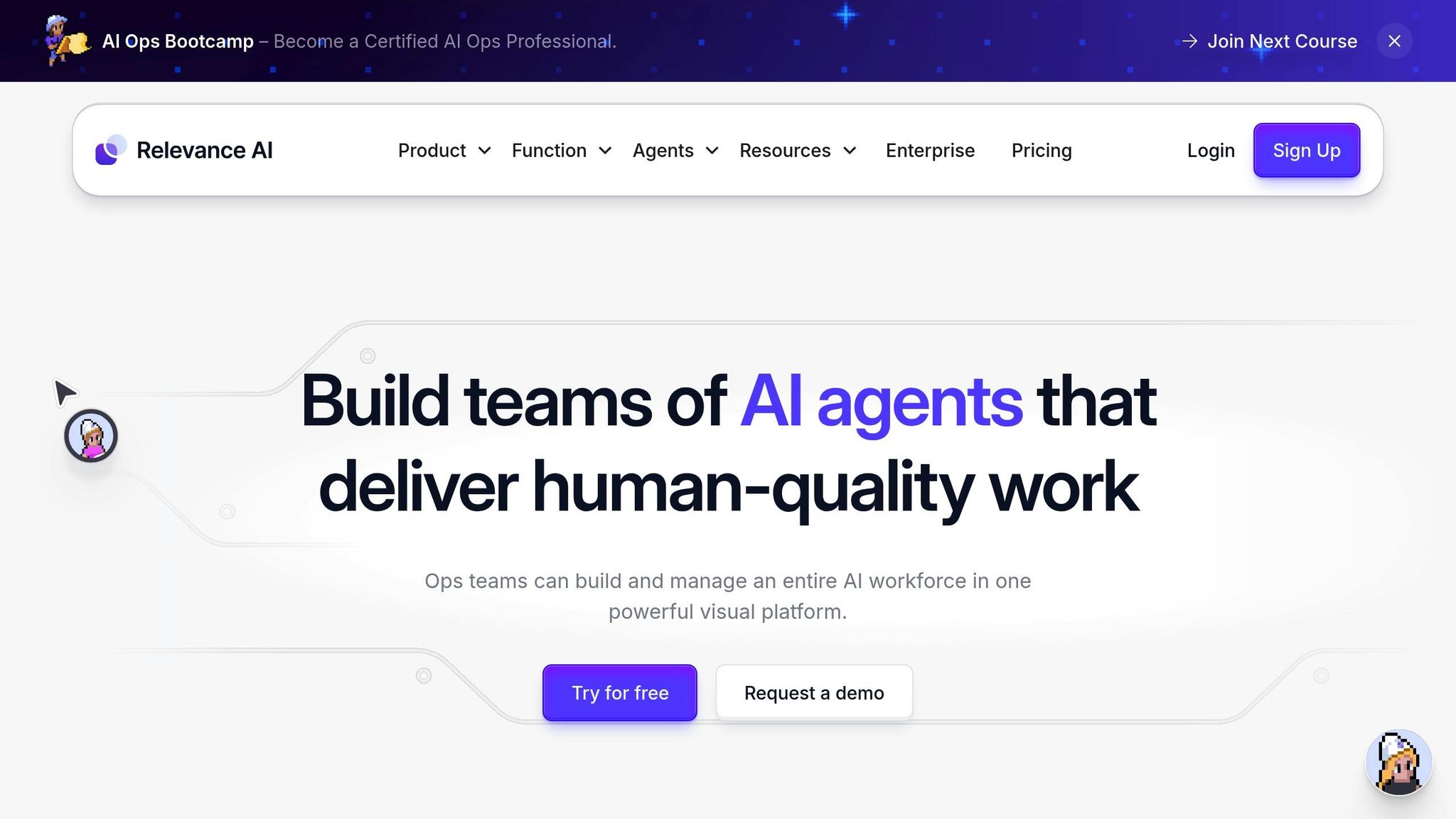
Relevance brings smarter automation to the forefront by using context-aware decision-making to streamline workflows and boost operational efficiency. Its design ensures seamless integration with existing systems, allowing businesses to make informed, data-driven decisions tailored to their unique needs.
Relevance easily connects with enterprise systems through flexible APIs and pre-built connectors, ensuring a smooth flow of real-time data across departments. Its context-aware engine evaluates incoming data to activate the right workflow actions, allowing decisions to align with current business conditions instead of relying on static rules.
The platform manages multiple AI models to address intricate decision trees and automate multi-step processes. Its intelligent routing system selects the best-suited AI model for each task, factoring in both the requirements and the context. This approach ensures efficient performance and optimal use of resources.
Relevance uses a usage-based pricing structure, offering detailed analytics that break down costs by workflow, department, and decision type. Automated cost management features dynamically adjust resource allocation to align with business priorities and budget limits, helping organizations maximize their investments.
The platform provides full audit trails for all automated decisions, offering clear insights into how contextual factors shape workflow outcomes. Role-based permissions safeguard access to sensitive workflows, while built-in compliance tools automate documentation and reporting to help organizations meet regulatory standards effortlessly.
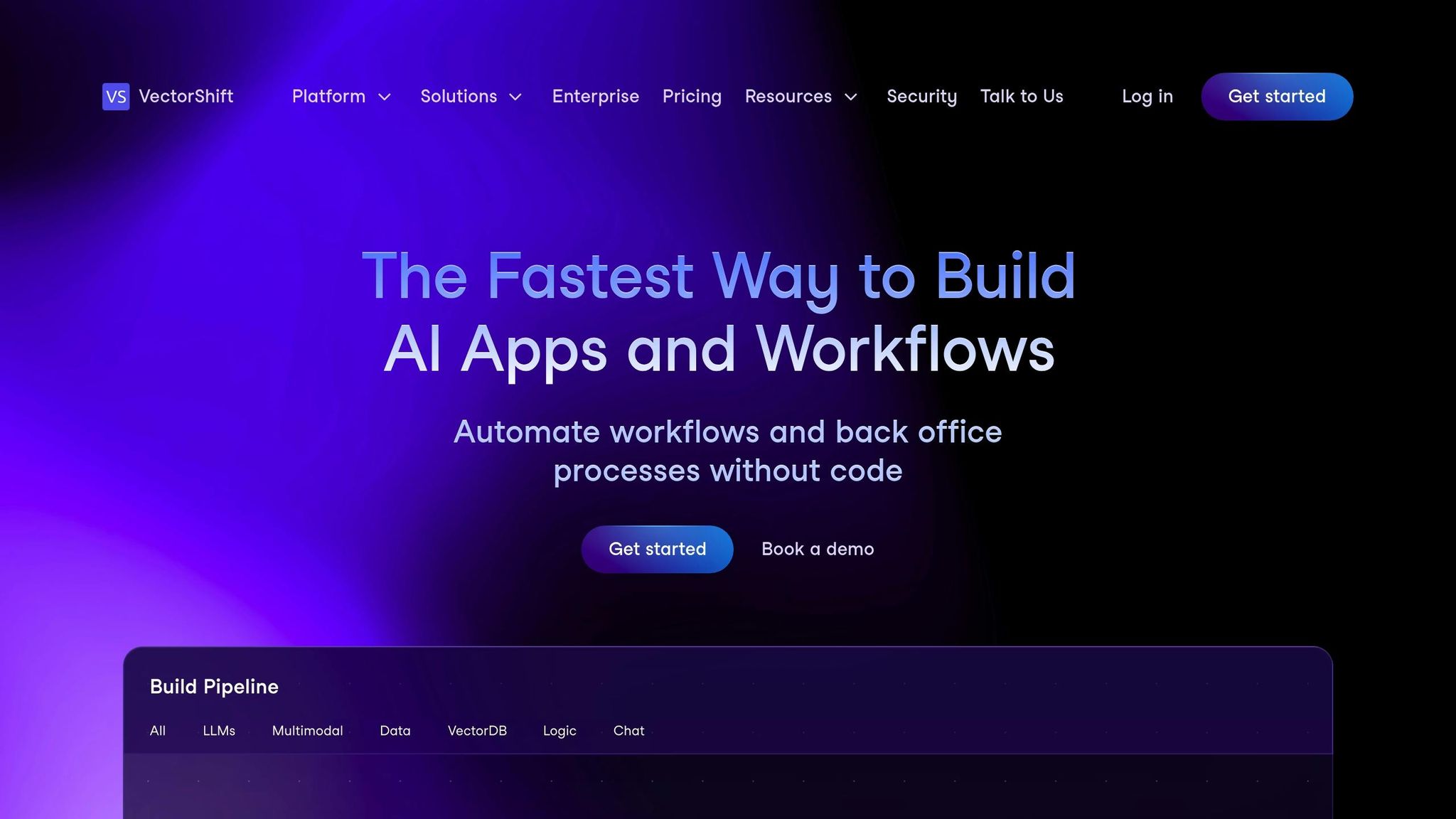
VectorShift is a secure platform tailored for managing AI workflows while adhering to strict industry regulations. Its commitment to security is reflected in its advanced compliance measures and encryption protocols.
VectorShift meets rigorous standards, including SOC 2 Type II, HIPAA, and GDPR compliance. It safeguards data with AES-256 encryption for stored information and TLS 1.3 for data in transit. Access control is reinforced through role-based access control (RBAC) and stringent authentication processes, backed by regular security audits and penetration testing.
To protect user privacy, the platform includes built-in PII protection features, ensuring sensitive information remains secure. Additionally, LLM guardrails are in place to align with content policies and regulatory requirements. Importantly, data-specific agreements ensure customer data is never used to train AI models, offering peace of mind for organizations handling sensitive information.
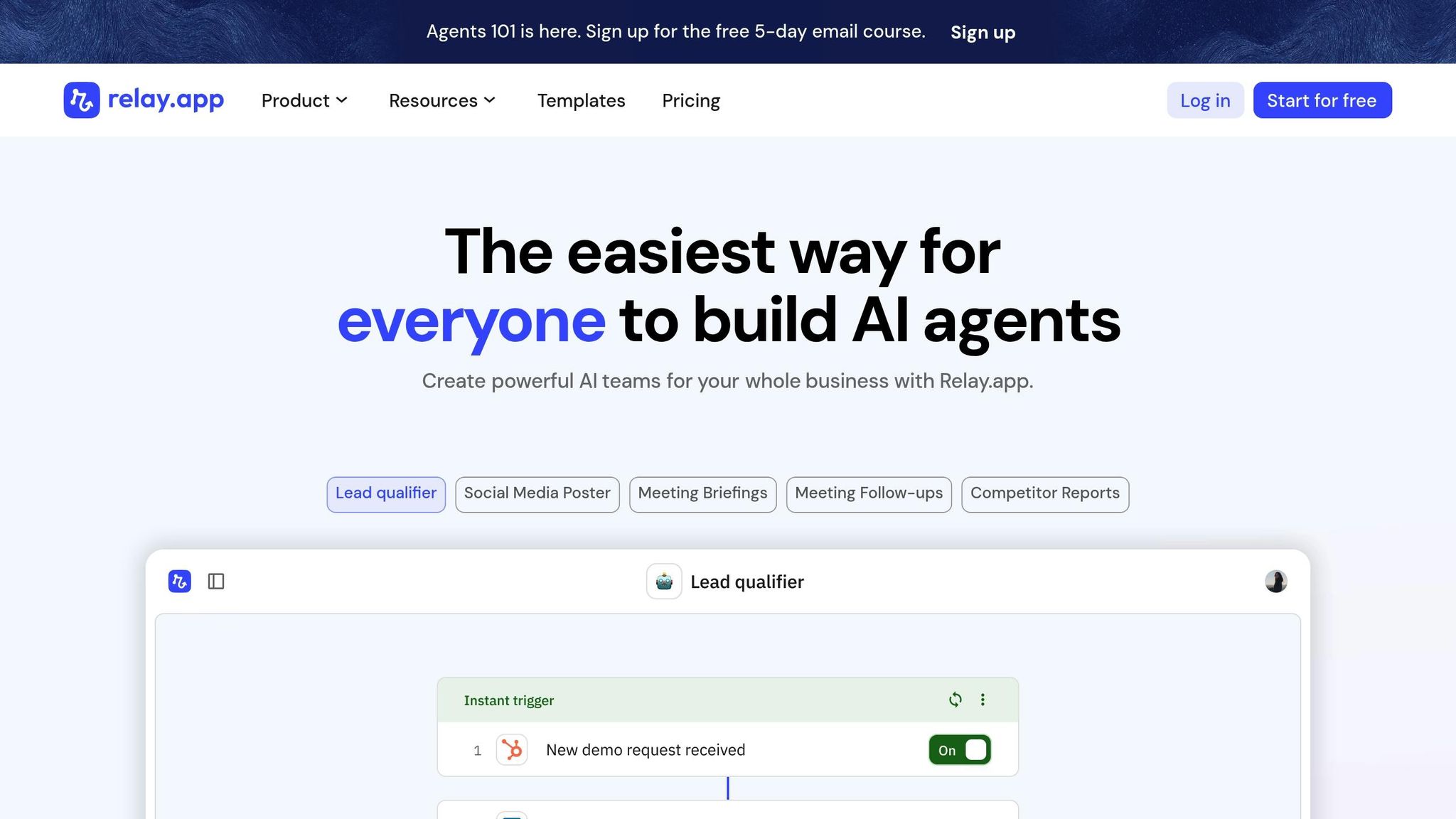
Relay simplifies managing workflows for both enterprise operations and teams without technical expertise. Its features cover integration, AI orchestration, cost control, and governance, keeping your processes efficient and secure.
Relay seamlessly connects with widely used business applications through API integrations. It also supports workflows that require human oversight, making it easy to incorporate custom or specialized apps into your processes.
Relay optimizes workflows by automatically selecting the best AI model for each task. Users can create consistency in AI interactions by utilizing custom prompts and pre-built template libraries.
With a usage-based pricing approach, Relay offers tools to monitor expenses, set spending limits, and identify opportunities to reduce costs effectively.
Relay prioritizes data security with advanced encryption, detailed audit logs, and role-based access controls. It also offers flexible deployment options to meet strict governance and compliance requirements.
Compare AI workflow solutions based on features, pricing, and integration options.
| Platform | Key Features | Advantages | Disadvantages | Pricing (USD) | Integration Options |
|---|---|---|---|---|---|
| Prompts.ai | Access to 35+ LLMs (GPT-5, Claude, LLaMA, Gemini), FinOps cost management, enterprise-level governance, and streamlined prompt workflows | Up to 98% cost savings, unified platform, pay-as-you-go TOKN credits, strong security measures | Relatively new platform with features still evolving | Personal: $0–$99/month Business: $99–$129/member/month |
API integrations, enterprise connectors, and customizable workflows |
| Lindy | No-code automation, AI-powered workflows, task coordination, and team collaboration | Simple to use, quick setup, and excellent automation tools | Limited options for advanced customizations | Pricing based on usage | Integrates with common business tools and APIs |
| Domo | Business intelligence tools, data visualization, AI-driven insights, and dashboard creation | Strong analytics capabilities, scalable for enterprises, and detailed reporting | Steeper learning curve; may be overly complex for basic workflows | Enterprise pricing available upon request | Over 1,000 pre-built connectors and cloud integrations |
| Gumloop | Drag-and-drop visual workflow builder, automation templates, and team collaboration features | Easy-to-use interface, rapid deployment, and a wide range of templates | Limited AI model options and fewer enterprise-grade features | Freemium model with paid tiers | Standard business apps and webhooks |
| Relevance | AI agent creation, workflow automation, data processing, and custom integrations | Highly adaptable agent configurations and strong data processing capabilities | Advanced features require technical expertise | Subscription-based pricing | Custom APIs and database connections |
| VectorShift | Vector database management, AI model deployment, workflow orchestration, and data pipelines | Optimized for advanced AI tasks and vector searches | High technical complexity; tailored for niche use cases | Enterprise pricing available upon request | Integrates with vector databases, ML platforms, and cloud services |
| Relay | Human-in-the-loop workflows, AI model optimization, cost monitoring, and governance tools | Automatic model selection, clear pricing, and strong compliance features | Fewer AI model options compared to specialized platforms | Usage-based pricing with cost controls | Business apps and custom API integrations |
This table highlights the strengths and limitations of each platform. Prompts.ai stands out for its transparent, pay-as-you-go pricing and extensive AI model access, while Domo excels with its vast library of pre-built connectors for enterprise integration. When choosing a solution, prioritize platforms that align with your needs for cost clarity, seamless integration, and security.
Selecting the right AI workflow platform is a pivotal decision that can shape your organization's future. With AI-enabled workflows projected to rise from 3% to 25% of enterprise processes by the end of 2025, making an informed choice now can secure a long-term advantage. Each platform comes with its own strengths in areas like cost efficiency, integration, and security, as explored earlier. Here's how to translate these priorities into practical benefits for your business.
Cost optimization should be a top consideration. Traditional AI setups can range from thousands to millions of dollars. To avoid unnecessary expenses, look for platforms with transparent pricing structures, such as unified subscriptions or pay-as-you-go plans. These models can help reduce costs significantly compared to paying for each AI model separately. Industry analyses consistently highlight the financial advantages of well-chosen AI solutions.
Scalability and integration are equally critical. Your platform should seamlessly grow alongside your business, accommodating increased workloads, more users, and larger data volumes without compromising performance. Additionally, robust integration through APIs and middleware ensures the platform can work harmoniously within your existing tech ecosystem, as discussed in earlier comparisons.
When dealing with sensitive data, security and compliance features are non-negotiable. Platforms must meet rigorous standards like GDPR, HIPAA, and SOC 2, offering tools such as encryption, role-based access controls, and audit logs. Integrated compliance tracking and full visibility into AI interactions across models and teams are essential for maintaining trust and governance.
To avoid vendor lock-in and maximize flexibility, consider platforms with multi-LLM capabilities and cloud-agnostic deployment options. These features allow you to optimize performance and costs while tailoring AI solutions to your organization's unique needs. Additionally, platforms that can retain knowledge of company policies, past projects, and internal practices are better equipped to deliver domain-specific insights instead of generic outputs.
Finally, address the growing skills gap in AI expertise. With a predicted shortage of 250,000 data scientists in the US by 2025, low-code and no-code platforms are becoming increasingly valuable. These tools empower non-technical users to harness AI capabilities while maintaining IT oversight, ensuring a strong return on investment.
To get started, define the specific challenges AI will address in your organization and establish clear evaluation criteria that balance capabilities with budget considerations. Prioritize clean, structured, and unified data management, and choose platforms that emphasize explainability and transparency. This approach builds trust among employees and leadership while ensuring measurable results for your business.
AI workflow platforms like Prompts.ai enable businesses to reduce expenses and improve efficiency by automating routine tasks, minimizing errors, and refining processes. By simplifying workflows, companies can reclaim valuable time, use resources more strategically, and concentrate on initiatives that deliver greater impact.
These tools also integrate smoothly with existing systems, ensuring uninterrupted operations and fostering better teamwork across departments. With the power of AI, businesses can see tangible benefits, such as cutting operational costs substantially and driving productivity to new levels.
Prompts.ai prioritizes security and compliance by integrating encryption, role-based access controls, and real-time threat detection to protect sensitive information. With data loss prevention (DLP) tools and secure API management, the platform adds extra layers of defense, while continuous monitoring actively identifies and addresses potential vulnerabilities.
To align with regulatory standards, Prompts.ai provides detailed audit trails and holds certifications such as AIRTP+, ensuring adherence to industry regulations. These robust features create a dependable and secure environment for managing AI-driven workflows efficiently.
AI workflow solutions take scalability to the next level by effectively handling increasing workloads and intricate operations. Their ability to integrate with various systems allows for smooth data sharing, which simplifies automation and sharpens decision-making processes.
By seamlessly aligning with existing tools and technologies, these solutions help cut down inefficiencies, enhance productivity, and empower businesses to respond to shifting demands without the need for costly infrastructure changes. They’ve become a key resource for refining workflows in today’s fast-paced business landscape.


